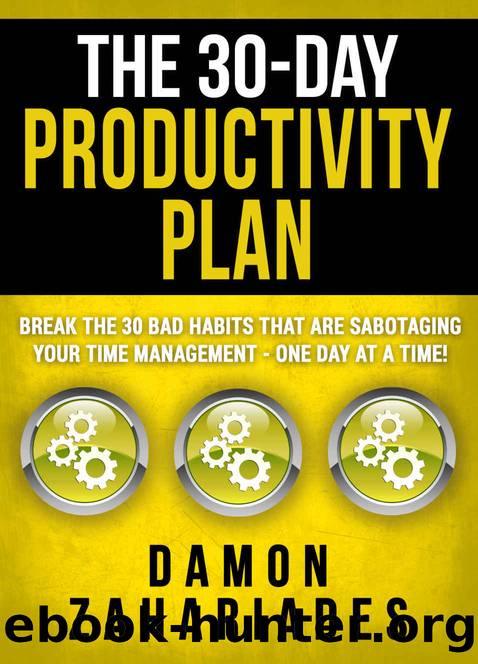The 30-Day Productivity Plan: Break The 30 Bad Habits That Are Sabotaging Your Time Management - One Day At A Time! (The 30-Day Productivity Boost Book 1) by Damon Zahariades

Author:Damon Zahariades [Zahariades, Damon]
Language: eng
Format: azw3
Publisher: Damon Zahariades
Published: 2016-02-03T00:00:00+00:00
Action Steps
1. Audit your current skill set. You have more areas of competence than you think.
Throughout your life, you have amassed knowledge and specialized skills in a wide range of disciplines. That knowledge and those skills can prove useful to you in future endeavors.
For example, I have a degree in Finance and Investments. Upon graduating from college, I accepted an accounting position with one of the top automakers. I then became a stockbroker. Then, I moved into a career in IT. For the past 20 years, Iâve been a writer in numerous capacities. Along the way, I learned about server management, Wordpress development and search engine optimization. All of these ventures imbued me with skills I use every day - in my business and personal life.
Your experience has likewise instilled within you a raft of specialized skills. Many of them will help you to tackle unfamiliar tasks and projects, even if they seem unrelated to your current and previous jobs.
2. Focus on your desired outcomes rather than the things that might go wrong along the way.
One of our survival instincts is to plan for things that might go wrong. In some circumstances, thatâs a valuable quality that protects us from harm. It prevents us from strolling down dark alleys in unpopulated locales. It discourages us from petting strange dogs.
In other circumstances, however, it can hold us back. The instinct prevents us from pursuing opportunities that can lead to improved aptitude as well as personal and professional growth.
By focusing on your desire outcomes, youâll find it easier to ignore your inborn fear of the unknown. Youâll be able to dismiss the voice in your head constantly whispering âWhat if XYZ happens?â
3. Look for opportunities to learn new skills. The self-confidence youâll gain will make you less fearful of tackling unfamiliar tasks.
Achieving a high level of competency in any discipline requires repeated exposure and application. Thereâs no other way to attain proficiency. The problem is a lack of courage. Itâs normal to feel hesitant, or even intimidated, when weâre given a new responsibility.
One way to boost your courage is to add to your overall skill set. Newly-learned skills donât have to be related to the unfamiliar task in front of you in order to offer value. The mere act of becoming proficient in them will give you more confidence in everything you do.
For example, many years ago, I learned how to code web pages using HTML and PHP. Learning those languages gave me the confidence to learn the basics of server management. One had nothing to do with the other. But I now had the confidence to learn to do the latter effectively. Had I not pushed myself to learn HTML and PHP, I would have avoided learning how to manage a server. I would have felt unready and fearful of failure.
Constantly broaden your skill set. Youâll benefit from increased confidence that will give you the courage to take on - and even volunteer for - new projects.
4. Remind yourself that youâll never be 100% ready.
Download
This site does not store any files on its server. We only index and link to content provided by other sites. Please contact the content providers to delete copyright contents if any and email us, we'll remove relevant links or contents immediately.
Effortless by Greg McKeown(1469)
Word Power Made Easy by Norman Lewis(1307)
How to Not Die Alone by Logan Ury(1303)
Beyond Order by Jordan B. Peterson;(1293)
So Good They Can't Ignore You by Cal Newport(1239)
Chatter by Ethan Kross(1060)
The Power of 100! by Shaun King(1050)
100 Things Successful People Do by Nigel Cumberland(1023)
Master of One by Jordan Raynor(998)
Lives of the Stoics by Ryan Holiday & Stephen Hanselman(956)
Napolean Hill Collection by Napoleon Hill(936)
The High 5 Habit by Mel Robbins(933)
The Art and Science of Results by Joe Vitale(899)
Be Your Best Self by Mike Bayer(884)
Kinesic Magic by Donald Tyson(841)
Friday Forward by Robert Glazer(836)
Career Fear (and how to beat it) by Somi Arian(825)
The Practice Is the Path by Tias Little(816)
The 7 Habits on the Go by Stephen R. Covey(810)
